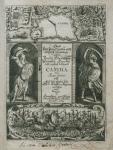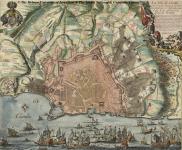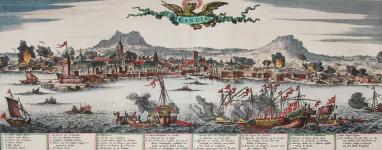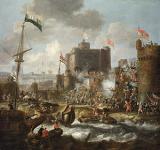

(The Poet:)
What
hand is swift and sure enough to write
of
Candia's tribulations and not stumble?
(The city speaks:)
I'm
now called Chandakas and "noble Candia",
for
I have faced the Ottomans' attacks;
at
Martinengo they broke down my walls,
at
Jesus too, yet all my gates stay closed.
(The Poet:)
The
Turks did likewise, blasting them with bombs,
bombarding
them with stones incessantly,
striking
at nobles, poor folk, youths and clergy,
soldiery,
children, innocent young nuns.
The
cannonshots converged within the town
striking
the churches, throwing down their towers,
entering
narrow streets, destroying houses,
while
all went running to defend the walls.
They
toppled palaces, crushed humble homes,
sweeping
down Broad Street to the city's heart;
from
Sand Beach they bombarded nearby parts
and
no-one dared to walk there in the open.
The
generals stood in cover of the walls,
inside
the town, to hear each new report.
These
two positions were both near the shore;
he
should have shown due care in speaking of it,
but
he discussed it openly, word spread,
and
Satan thus could breach Barozzi's heart...
from
Sand Beach and Saint Andrew's bastion,
for
in that sector there was no protection.
That
pitiless Barozzi heard it all,
heard
their assessments, and made up his mind
to
be a Judas, a perfidious traitor;
so
he divulged it; he went out one night,
found
the Vizier and told him what he knew,
all
he'd heard from Monsieur, what would ensue.
The
Vizier ordered them to dig close in
to
the walls, to hurl bombs in and kill defenders...
They
closed in on Saint Andrew's bastion,
while
many approached Sand Beach from Maroulás.
All
you could see in town was dust and smoke,
from
countless shots that came in endlessly.
How
many fell, how many people lost
to
cannon and musket! Others took their place
to
hold the city for the love of Christ,
and
all the Greeks came out to give their lives
to
a death most pitiless — who could describe
their
pains? He'd soak the paper with his tears.
Oh
Candia, in your pain, what mighty fire
has
turned your town to ash from end to end!
No
house remains intact, no door, no window,
no
monastery, no bell-tower is undamaged!
The
Outer Town destroyed, its people all
scattered
about, with wretched holes for homes.
Yet
Venice still boasts of her Candia,
because
the city walls still stand unbreached.
(The city speaks:)
The
stones rain down, the cannonballs like hail,
the
cannonfire like thunder, no relief.
My
churches he's destroyed, he's felled my towers,
tornado-like
he's tried to sweep me up.
All
who once knew me would not know me now,
they
beat their breasts in grief and weep for me.
I
pray you through my tears, Lord, hear me now,
deliver
me from all these present torments.
You
too, my Lady, Mary, much revered
Bringer
of Peace, I beg you, rescue me.
My
own Saint Titus and Ten Martyr Saints,
join
all together now, come to my aid.
O
pitiless Death, stay your advance at last
on
the spilt blood, shut yourself in your lair.
You've
never tired of ranging to and fro,
cutting
down victims with your savage scythe.
Oh
jealous, thoughtless, pitiless Death, how many
lives
you have seized, yet want as many more
Muslim and Christian souls
to send to Hades,
of
many nations; still you know no pity.
Insatiable,
you've still not seen enough
in
this poor city, no, as long as yet
a
single life remains, you'll seek to crush it;
you'll
only cease when none are left to kill.
Three
Martyrs' Church they stripped, and all nearby,
Christ
Kefalás', St Catherine's monastery.
They
took the Holy Blood and stowed it safe,
they
packed the Bringer of Peace, the holy relics,
took
down the Ten Saints, took away the icons,
all
of them, that adorned Saint Titus' church.
They
stripped the churches, took books, ammunition,
collected
biscuit, weapons, bells and icons.
Europe,
lament this day, tear out your hair!
My
end is near, alas, they'll hand me over,
to
gain respite, they'll let me be enslaved.
When
all terms of surrender were agreed
he
gave them eight days to vacate the city.
All
night you'd see them loading up the boats,
with
women, men and goods to take to Dia.
Weep
for me, friends and family, weep for me,
weep
for me, all you Christians, in my grief.
Earth,
fire and water, weep for me together,
and
heaven, draw now a veil across your face.
Let
clouds bring lightening-bolts and thunder now
to
hide the sun, lest it should shine on me.
Weep
for me, springs and rivers, lakes and streams,
hills,
mountains, plains, roses and violets all.
Shed
tears for me today, you perfumed flowers,
you
flowery meadows and you trees in bloom.
Weep
for me, stars in heaven, moon and clouds;
planets
and Pleiades, come, share my grief.
Sun,
turn your light to darkness on this day.
a
sign for all to see in East and West,
so
they may know that I will be no more,
that
all who've ever seen me may lament.
(The poet)
Since
time was running out, they could not dally,
at
mid-day they began to leave in groups.
They
left the town locked up, without a soul,
no
living thing remained within its walls;
they
even took their dogs, so not to leave them
for
the Ottomans to find and to inherit.
It
was a Wednesday evening when they left
their
noble homeland, sunk in bitter grief.
(The city speaks:)
Alas,
who was to blame, what cursèd fortune,
or
what blind destiny, what blind device
brought
you to me, to seal my evil fate?
What
winds assisted you, what waves conveyed you,
what
star showed you the way, what evil planet
brought
you for my sake to the isle of Crete?
You
came, you fought, and you will tell the tale,
but
never claim you won me by the sword.
My
eyes, what do you see? Be darkened now,
so
when the Turks come in you will not see.
Oh
glorious Fortress, all those that survive,
do
they still weep, do they still pine for you?
1. More
 | 5. The “Cretan War” | |
|---|---|---|
 | 5.1 The Siege and the Fall of Candia (1648-1669) | |
 | 5.2 Cretan War and sank of La Thérèse | |
 | 5.3 The evacuation of Candia | |
 | 5.4 The Cretan War in the Literature | |
 | 5.4.1 Anthimos (Akakios) Diakrousis | |
 | 5.4.2 Marinos Tzanes Bounialis |